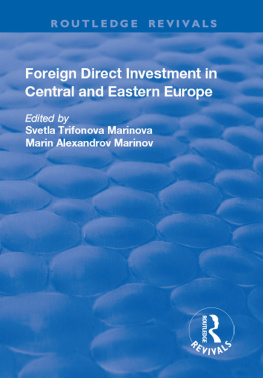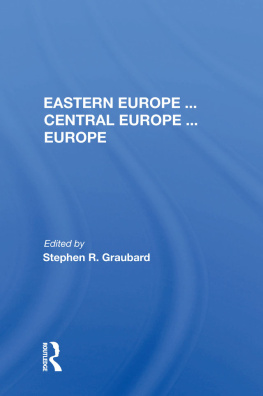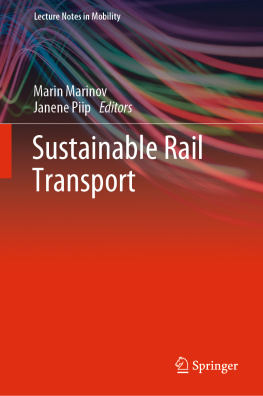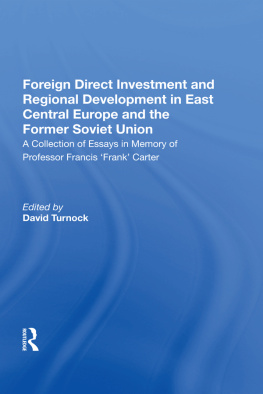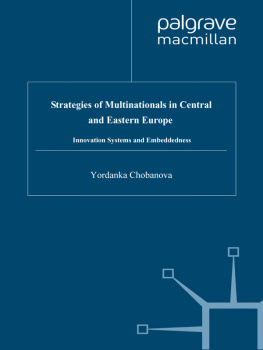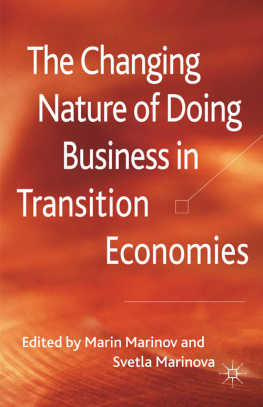Marinov Marin - Foreign direct investment in Central and Eastern Europe
Here you can read online Marinov Marin - Foreign direct investment in Central and Eastern Europe full text of the book (entire story) in english for free. Download pdf and epub, get meaning, cover and reviews about this ebook. City: London, Europe, Central., Europe, Eastern., year: 2018, publisher: Routledge, genre: Politics. Description of the work, (preface) as well as reviews are available. Best literature library LitArk.com created for fans of good reading and offers a wide selection of genres:
Romance novel
Science fiction
Adventure
Detective
Science
History
Home and family
Prose
Art
Politics
Computer
Non-fiction
Religion
Business
Children
Humor
Choose a favorite category and find really read worthwhile books. Enjoy immersion in the world of imagination, feel the emotions of the characters or learn something new for yourself, make an fascinating discovery.
- Book:Foreign direct investment in Central and Eastern Europe
- Author:
- Publisher:Routledge
- Genre:
- Year:2018
- City:London, Europe, Central., Europe, Eastern.
- Rating:3 / 5
- Favourites:Add to favourites
- Your mark:
- 60
- 1
- 2
- 3
- 4
- 5
Foreign direct investment in Central and Eastern Europe: summary, description and annotation
We offer to read an annotation, description, summary or preface (depends on what the author of the book "Foreign direct investment in Central and Eastern Europe" wrote himself). If you haven't found the necessary information about the book — write in the comments, we will try to find it.
Foreign direct investment in Central and Eastern Europe — read online for free the complete book (whole text) full work
Below is the text of the book, divided by pages. System saving the place of the last page read, allows you to conveniently read the book "Foreign direct investment in Central and Eastern Europe" online for free, without having to search again every time where you left off. Put a bookmark, and you can go to the page where you finished reading at any time.
Font size:
Interval:
Bookmark:

FOREIGN DIRECT INVESTMENT IN CENTRAL AND EASTERN EUROPE
Transition and Development
Series Editor: Professor Ken Morita
Faculty of Economics, Hiroshima University, Japan
The Transition and Development series aims to provide high quality research books that examine transition and development societies in a broad sense -including countries that have made a decisive break with central planning as well as those in which governments are introducing elements of a market approach to promote development. Books examining countries moving in the opposite direction will also be included. Titles in the series will encompass a range of social science disciplines. As a whole the series will add up to a truly global academic endeavour to grapple with the questions transition and development economies pose.
Also in the series:
Institutional Change in Transition Economies
Edited by Michael Cuddy and Ruvin Gekker
ISBN 0 7546 1977 X
The Social Impact of Informal Economies in Eastern Europe
Edited by Rainer Neef and Manuela Stanculescu
ISBN 0 7546 1950 8
Small Firms and Economic Development in Developed and Transition Economies: A Reader
Edited by David A. Kirby and Anna Watson
ISBN 0 7546 3060 9
Modeling Russias Economy in Transition
Peter Wehrheim
ISBN 0 7546 3299 7
Facilitating Transition by Internationalization Outward Direct Investment from Central European Economies
Edited by Marjan Svetlicic and Matija Rojec
ISBN 0 7546 3133 8
Enhanced Transition Through Outward Internationalization Outward FDI by Slovenian Firms
Andreja Jaklic and Marjan Svetlicic
ISBN 0 7546 3134 6
Foreign Direct Investment in Central and Eastern Europe
Edited by
SVETLA TRIFONOVA MARINOVA
University of Birmingham, United Kingdom
MARIN ALEXANDRO V MARINOV
University of Gloucestershire, United Kingdom
and
University of Umea, Sweden

First published 2003 by Ashgate Publishing
Reissued 2018 by Routledge
2 Park Square, Milton Park, Abingdon, Oxon OX14 4RN
711 Third Avenue, New York, NY 10017, USA
Routledge is an imprint of the Taylor & Francis Group, an informa business
Copyright Svetla Trifonova Marinova and Marin Alexandrov Marinov 2003
Svetla Trifonova Marinova and Marin Alexandrov Marinov have asserted their moral right to be identified as the authors of this work in accordance with the Copyright, Designs and Patents Act, 1988.
All rights reserved. No part of this book may be reprinted or reproduced or utilised in any form or by any electronic, mechanical, or other means, now known or hereafter invented, including photocopying and recording, or in any information storage or retrieval system, without permission in writing from the publishers.
Notice:
Product or corporate names may be trademarks or registered trademarks, and are used only for identification and explanation without intent to infringe.
Publishers Note
The publisher has gone to great lengths to ensure the quality of this reprint but points out that some imperfections in the original copies may be apparent.
Disclaimer
The publisher has made every effort to trace copyright holders and welcomes correspondence from those they have been unable to contact.
A Library of Congress record exists under LC control number: 2002038370
ISBN 13: 978-1-138-70758-0 (hbk)
ISBN 13: 978-1-315-19896-5 (ebk)
Contents
Marin Alexandrov Marinov and Svetla Trifonova Marinova
Shaukat Ali, Jan Nowak and Josef Pschl
Carl H. McMillan and Ken Morita
Alojzy Z. Nowak and Jeff Steagall
Svetla Trifonova Marinova and Marin Alexandrov Marinov
Nadiya Mankovska and James W. Dean
Kari Liuhto and Jari Jumpponen
Marin Alexandrov Marinov, Ken Morita and Svetla Trifonova Marinova
Refik Culpan and Emin Akcaoglu
Christos N. Pitelis
Marian Gorynia, Jan Nowak and Radoslaw Wolniak
Valeria Szekeres
Sonia Ferencikova
Inkeri Hirvensalo and Piia Heliste
Jarmo Nieminen
Zsuzsanna Vincze
Emin Akcaoglu, Ankara University, Turkey
Shaukat Ali, University of Wolverhampton, England
Refik Culpan, Pennsylvania State Universty, USA
James W. Dean, Simon Fraser University, USA
Sonia Ferencikova, University of Bratislava, Slovakia
Marian Gorynia, University of Poznan, Poland
Piia Heliste, Helsinki School of Economics, Finland
Inkeri Hirvensalo, Helsinki School of Economics, Finland
Jari Jumpponen, Lappeenranta University of Technology, Finland
Kari Liuhto, Lappeenranta University of Technology, Finland
Carl H. McMillan, Carleton University, Canada
Nadiya Mankovska, Institute for Economic Research, Ukraine
Marin Alexandrov Marinov, University of Gloucestershire, England
Svetla Trifonova Marinova, University of Birmingham, England
Ken Morita, Hiroshima University, Japan
Jarmo Nieminen, University of Sejnioki, Finland
Alojzy Z. Nowak, University of Warsaw, Poland
Jan Nowak, University of the South Pacific, Fiji Islands
Christos N. Pitelis, Cambridge University, England
Josef Pschl, Vienna Institute of International Economic Studies, Austria
Jeff Steagall, University of North Florida, USA
Valeria Szekeres, Ministry of Education, Hungary
Zsuzsanna Vincze, Turku School of Economics, Finland
Radoslaw Wolniak, University of Warsaw, Poland
MARIN ALEXANDROV MARINOV and SVETLA TRIFONOVA MARINOVA
Foreign direct investment (FDI) is a part of broader activities bringing internationalization and economic integration of businesses worldwide. Trade among nations dates from ancient times. In the recent historic past Dutch, English, French, Portuguese and Spanish firms promoted international trade in their overseas colonies. Gradually, those firms started establishing production facilities in home markets. These activities can be regarded as initial FDI undertakings. Contemporary FDI started in the early 1950s when multinational firms began creating production networks spreading all over the world.
While after World War II the industrialized world got involved in internationalizing activities through FDI, the countries of Central and Eastern Europe (CEE) were developing inward integration within the Council for Mutual Economic Assistance (CMEA) for both trade and investment activities. The economic climate in the CEE region changed after the fall of the Berlin Wall in 1989. Since then there has been a radical change in the flow of capital from developed countries towards countries of the former Soviet Bloc.
Transition CEE countries have adopted different approaches towards the creation and implementation of FDI policies and strategies. The Czech Republic, Estonia, Hungary and Poland, having appreciated FDI as a major stimulus to transition to market as well as a main boost to economic growth, have adopted open and facilitating inward FDI policies at various periods of their early transition to market. Simultaneously, a number of CEE countries started participating in outward FDI activities. In absolute terms Russia and Hungary are among the best performers in this respect (Marinov, 2002).
Taking the investors perspective, FDI has always been associated with the process of resolving a number of issues. The process of international capital flows is associated with the assumption of a certain degree of risk depending on the environmental characteristics, among others; political, economic, commercial, and financial. Drives that can motivate foreign investors to undertake FDI activities can fall into several categories (Dunning, 1993). They are
Font size:
Interval:
Bookmark:
Similar books «Foreign direct investment in Central and Eastern Europe»
Look at similar books to Foreign direct investment in Central and Eastern Europe. We have selected literature similar in name and meaning in the hope of providing readers with more options to find new, interesting, not yet read works.
Discussion, reviews of the book Foreign direct investment in Central and Eastern Europe and just readers' own opinions. Leave your comments, write what you think about the work, its meaning or the main characters. Specify what exactly you liked and what you didn't like, and why you think so.

